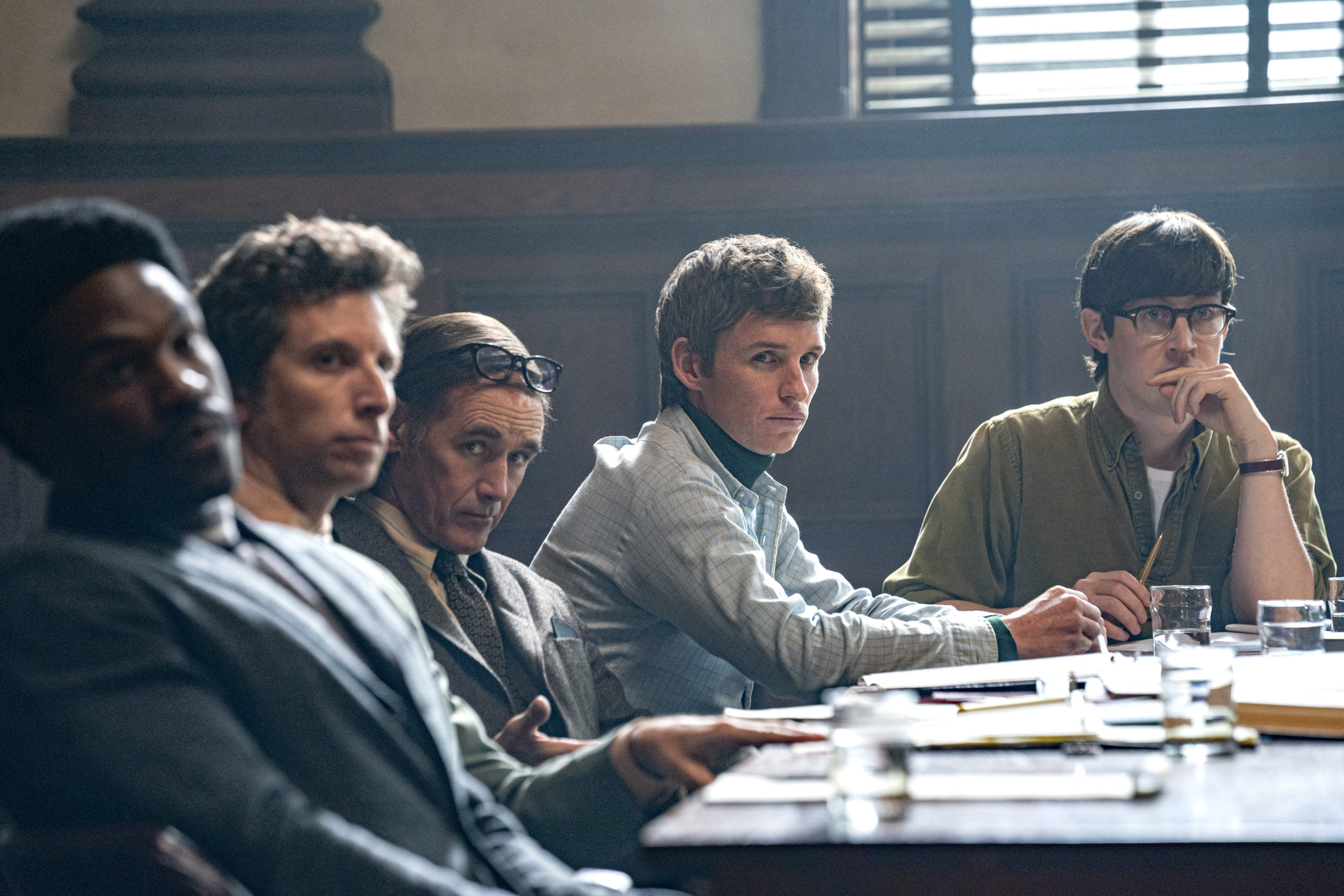
Fragmented youthful leftists idealistically trying to create a world that may never be, dirty tactics from administration officials who we would later found out are more corrupt than the leftists they seek to destroy, a partisan judiciary, and American law enforcement displaying a level of antisocialism that displays their assuredness that they are above the law. This may sound like I’m describing this morning’s edition of The Washington Post, but the things listed above are part of the tumultuous late 1960s where the latest film from famed television and screenwriter turned Aaron Sorkin transports us to.
The Trial of the Chicago 7 centers around the trial of Abbie Hoffman (Sacha Baron Cohen), Jerry Rubin (Jeremy Strong), Tom Hayden (Eddie Redmayne), David Dellinger (John Carrol Lynch), Rennie Davis (Alex Sharpe), Lee Weiner (Noah Robbins), and John Froines (Daniel Flaherty) who, along with Bobby Seale (Yahya Abdul-Mateen II), were charged with conspiracy to incite a riot following the famed violent clash between Chicago Police and anti-Vietnam war protestors at the 1968 Democratic Convention. The seven are represented by first amendment lawyers William Kuntzler (Mark Rylance) and Leonard Weinglass (Ben Shenkman) against Justice Department lawyers Richard Schultz (Joseph Gordon-Levitt) and Tom Foran (J. C. MacKenzie) amidst a chaotic courtroom overseen by Judge Julius Hoffman (Frank Langella). The trial challenges the notion of justice, the function of justice, and the state of protest in America, not just in the twilight of the fiery 1960s, but in our own time.
Thematically, Sorkin’s latest serves as a sort of accounting that the past is prologue and though we may think otherwise, the issues and obstacles that we face throughout our society are the same as they ever were. The dynamics of the defendants in the trial can be readily found on your Twitter feed on a daily basis as idealistic and confrontational progressives engage in an intellectual tug of war with more moderate liberals who hope to create change within existing systems of power while black activists watch it all while shaking their heads at philosophical debates between well off young white liberals they can ill afford to participate in while attempting to dodge very real physical force from the uniformed enforcers of the powers that be. The Trial of the Chicago 7 illustrates this clearly in its depiction of its characters and the realistic portrayal of the relationships. Sacha Baron Cohen’s Abbie Hoffman and Eddie Redmayne’s Tom Hayden deftly illustrate the ideological butting of the heads between separate liberal factions as their barely concealed distrust of each other is second only to the conflict between the defendants and the country’s power structure. Their conflict is a thread throughout and both actors believably convey the nature of the schism in leftist politics and the underlying respect between those with the same goals in mind but different views on how to reach them.
Yahya Abdul-Mateen II continues his meteoric rise of late in his supporting role as Bobby Seale completely transforming himself in a way that is convincing and unlike his previous high-profile performances. Mateen display the ability to disappear into a role while maintaining the charisma that has made him a standout and bringing the necessary emotion to the role of the legendary Black Power Movement leader. The aforementioned Baron Cohen is the film’s other standout, taking Sorkin’s trademark snappy, clever dialogue and infusing it with his own trademark humor that turns his interpretation of Hoffman into a draw that is tough to take your eyes off of. While Sorkin’s dialogue style is present in the film, it’s not overwhelming here and works in context of the picture itself. There is a courtroom cross-examination scene where it is used to great effect in tandem with quick cuts that incorporate flashbacks to the conversation in question that is creative, stylish, and demonstrates why many have fallen in love with the style. The Trial of the Chicago 7 balances its tone between comedy and seriousness in a way that creates superb pacing and allows viewers to remain invested and engaged while also creating thoughtful parallels between the politics of yesteryear and the world surrounding us today. Aaron Sorkin’s second directorial effort builds off of his first (2017’s Molly’s Game) and provides a window into the past that may create a greater understanding of our presence and a guide path for our future.
Image: Netflix

